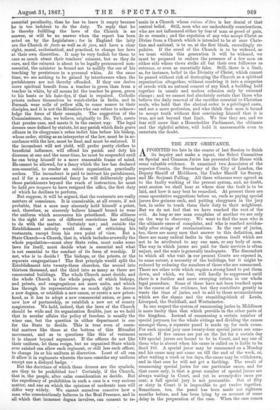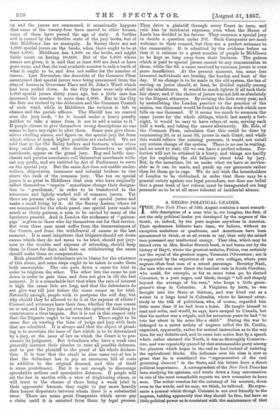THE JURY GRIEVANCE.
APPOINTED too late in the course of last Session to finish its inquiry and make a report, the Select Committee on Special and Common Juries has presented the House with some valuable evidence. It examined two Associates of the superior Courts, the Secondary of the City of London, the Deputy Sheriff of Middlesex, -the Under Sheriff for Surrey, and Mr. Serjeant Pulling. All these witnesses were agreed as to the faulty working of the present system, and, no doubt, next session we shall hear at whose door the fault is to be. laid, and how it may best be remedied. At present there are some speculative suggestions before us, such as paying special jurors five guineas each, and putting clergymen in the jury box, in order to teach them their duty to their neighbour. But we do not feel that we have reached the root of the evil. As long as one man complains of another we are only on the way to discovery. We want to find the man who is the ultimate cause of complaint, and who is reached acciden- tally after strings of recriminations. In the case of juries, too, there are many men that answer to this definition, and there are many radical faults in the system itself which are not to be attributed to any one man, or any body of men.. The way in which jurors are paid for their services is often unjust, and the scale is generally inadequate. The discomfort to which all who wait is our present Courts are exposed is, to some extent, a necessity of the buildings, but it might be reduced by reducing the numbers of those who are summoned. There are other evils which require a strong hand to put them down, and which, we fear, will hardly be suppressed until there is a further and more sweeping reform in our, whole legal procedure. Some of these have not been touched upon in the course of the evidence, but they contribute greatly to waste the time of juries, and to add to those accumulations which are the shame and the stumbling-block of Leeds, Liverpool, the Guildhall, and Westminster.
In one respect the system of summoning juries in Middlesex is more faulty than that which presidia in the other parts of the kingdom. Instead of summoning a certain number of special jurymen for the whole sittings and dividing the causes amongst them, a separate panel is made up for each cause. For each special jury case twenty-four special jurors are sum- moned. If five causes are put on the list for a certain day 120 special jurors are bound to be in Court, and any one of them who is absent when his cause is called on is liable to be fined 101. A special juror may be summoned on a Monday and his cause may not come on till the end of the week, or, after waiting a week or ten days, the cause may be withdrawn, and in that case he will not get a farthing. The result of summoning special juries for one particular cause, and for that cause only, is that a great number of special jurors are always waiting in Court, and yet in seventy-five cases per cent. a full special jury is not procurable. Out of fifty or sixty in Court it is impossible to get twelve together. Sometimes, too, the panel has been made out eighteen months before, and has been lying by on account of some delay in the preparation of the case. When the case comes on and the jurors are summoned, it occasionally happens that some of the twenty-four have moved to other houses, some of them have passed the age of sixty. A further evil is caused by the defective state of the jury books, but of this Middlesex has no monopoly. In Surrey there are not 1,000 special jurors on the books, when there ought to be at least 4,000. Middlesex has 1,800 on the books, and might fairly count on having 10,000. But of the 1,800 whose names are given, it is said that at least 800 are dead or have gone away, and that the real available number is only a tenth of what it ought to be, and does not suffice for the number of causes. Last November, the Associate of the Common Pleas ascertained that special jurors were being summoned from the sites of houses in Grosvenor Place and St. John's Wood which had been pulled down. In the City there were only about 1,000 special jurors thirty years ago, but a little care has increased the number to more than 4,000. But in the City the lists are revised by the Aldermen and the Common Council of each ward, while in Middlesex the revision is left to chance and the parish officers. The Sheriff has no control over the jury book, " he is bound under a heavy penalty neither to take a name from it nor to add a name to it." If people choose to give themselves wrong descriptions no one seems to have any right to alter them. Some men give them- selves swelling names, and figure on the special jury list from which others of much higher position are excluded. We are told that at the Old Bailey butlers and footmen, whose wives ]eep small shops, and who describe themselves as spirit merchants, appear on the grand jury. Bag and bottle mer- chants and potatoe merchants call themselves merchants with- -out any prefix, and are entitled by Act of Parliament to serve on the special jury. But the same Act does not enable under- writers, shipowners, insurance and colonial brokers to rise above the rank of the common jury. The tax on special jurors is so great in Middlesex that men who have originally called themselves " esquire " sometimes change their designa- tion to " gentleman," in order to be transferred to the numerous and lightly worked roll of common jurors. Yet there are persons who covet the work of special jurors and make a small living by it. At the Surrey Assizes, *here 48 are summoned for the whole panel, one special juror made as much as thirty guineas, a sum to be envied by many of the barristers present. And in London the nickname of " guinea- pigs " is given to those who lay themselves out for that service. But even these men must suffer from the inconveniences of the Courts, and from the withdrawal of causes at the last moment. It is most iniquitous that litigants should set down causes which they do not mean to be tried, should put jury- men to the trouble and expense of attending, should keep them in Court for days, and then on withdrawing the cause should make them no compensation.
Both plaintiffs and defendants are to blame for the existence of this abuse, and some steps ought to be taken to make them both answerable. The one puts down a cause for trial in order to frighten the other. The other lets the cause be put down in order to gain time, and does not give in till the last moment. It is a remarkable fact that when the rate of interest is high the cause lists are long, and that the defendants do not give way till just before the cause comes on for trial. Naturally enough, people wish to postpone the evil day, but why should they be allowed to do it at the expense of others ? Counsel and attorneys have their fees, whether the case comes on or not, and the jury has not even the option of declining to countenance a time bargain. But it is not in this respect only that the litigants ought to be restrained. There ought to be some fine on wasting the time of judge and jury with facts that are admitted. It is always said that the object of plead- ing is to ascertain the issue of fact which is to be determined by a jury, or the issue of law on which the Court is to pro- nounce its judgment. But defendants who have a weak case generally instruct their pleader to raise all possible defences, and to put the plaintiff to the proof of his whole declara- tion. It is true that the result in nine cases out of ten is that 'the defendant has to pay an enormous bill of costs in addition to the original demand, and this of itself is some punishment. But it is not enough to discourage speculative actions and speculative defences. If people will set the law in motion with a view of frightening others, or will trust to the chance of there being a weak joint in their opponents' harness, they ought to pay more heavily than honest disputants between whom there is a substantial issue. There are some great Companies which never pay a claim until it is extorted from them by legal process. They drive a plaintiff through every Court in turn, and ruin him by incidental expenses, even when the House of Lords has decided in his favour. They summon a special jury to decide a question under 201. Such Companies are most welcome to their counsel, but they are a perfect nuisance to the community. It is admitted by the evidence before us that it is ruinous to a great number of people in Middlesex to be kept so long away from their business. The guinea which is paid to special jurors cannot be any remuneration to them, while the 8d. a cause received by common jurors is even more insufficient. At the present moment, too, some less favoured individuals are bearing the burden and heat of the day. If no change is to be made in the old system, the tax of serving on juries should, at least, be divided equally among all the inhabitants. It would be much lighter if all took their fair share, and if the choice of jurors was not left so absolutely, to the litigant attorneys. By revising the lists every year, and by assimilating the London practice to the practice of the assizes, ten thousand would be found to do the work which now falls on one thousand. If it seems too much to summon the same jurors for the whole sittings, which last nearly a fort- night, it would be easy to have relays of men, serving each half a week, and taking the causes alternately. Mr. Erle, of the Common Pleas, calculates that this could be done by summoning 30, or at most 86, jurors in each Court, and while this would relieve the existing pressure, it would not entail any serious change of the system. There is no use in waiting, and no need to wait, till we can have a perfect scheme. Per- fection will not be attained in a hurry, and things are hardly ripe for exploding the old fallacies about trial by jury. But, in the meantime, let us make what we have as service- able as it can be made, and pat& up our garments rather than let them go to rags. We do not wish -the householders of London to be victimised, in order that there may be a general outcry against our legal procedure, nor does our belief that a great work of law reform must 'be inaugurated ere long persuade us to be at all more tolerant of incidental abuses.































 Previous page
Previous page